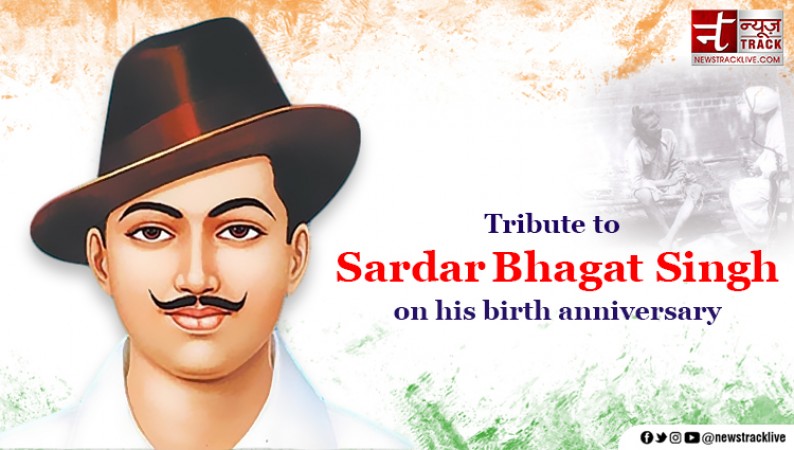
On September 28th, India pays tribute to one of its most iconic and fearless freedom fighters, Shaheed Bhagat Singh, on the day of his birth and death anniversary. Bhagat Singh's contribution to India's struggle for independence remains etched in the annals of history as a symbol of unwavering courage and dedication to the cause. As we remember the life and sacrifice of this extraordinary patriot, let us delve into the story of Bhagat Singh and the significance of September 28th in honoring his memory.
Early Life and Radicalization
Born on September 28, 1907, in the village of Banga in the Lyallpur district of Punjab (now in Pakistan), Bhagat Singh came from a patriotic family deeply committed to the freedom struggle. His father, Kishan Singh Sandhu, and uncle, Sardar Ajit Singh, were prominent leaders in the struggle for independence, which significantly influenced young Bhagat Singh's political awakening.
As Bhagat Singh grew, he became increasingly disillusioned with British rule and the Jallianwala Bagh massacre of 1919 left a lasting impact on him. The brutal killing of innocent civilians in Amritsar was a turning point, driving him towards radicalization. Bhagat Singh joined the Hindustan Republican Association (HRA), a revolutionary organization committed to ousting the British from India through armed struggle.
Acts of Courage and Defiance
Bhagat Singh's involvement with the HRA marked the beginning of a period of intense activism. He, along with other like-minded revolutionaries, began carrying out daring acts of defiance against British colonial rule. One of the most significant events was the Assembly Bombing incident of April 8, 1929, where Bhagat Singh and Batukeshwar Dutt threw non-lethal smoke bombs in the Central Legislative Assembly in Delhi. They were arrested but used the trial as a platform to express their revolutionary ideals and demand better treatment for political prisoners.
Perhaps the most iconic act associated with Bhagat Singh is the killing of John Saunders, a police officer responsible for the brutal lathi charge on Lala Lajpat Rai during a protest against the Simon Commission. However, it was a case of mistaken identity, as Saunders was not the intended target. Nevertheless, Bhagat Singh and his associates evaded capture for several months and continued their fight against the British.
Hunger Strike and Execution
In prison, Bhagat Singh and his comrades launched a hunger strike demanding better conditions for political prisoners. This strike gained widespread support and drew attention to the inhumane treatment of those incarcerated for their revolutionary activities. Despite deteriorating health, Bhagat Singh, Rajguru, and Sukhdev remained resolute in their determination.
Tragically, Bhagat Singh's life was cut short at the tender age of 23. On March 23, 1931, he, along with Rajguru and Sukhdev, was sentenced to death for their involvement in the killing of John Saunders. Despite widespread protests and appeals for clemency, the British colonial authorities executed them on March 23, 1931, in Lahore Central Jail.
Legacy and Significance
Bhagat Singh's sacrifice had a profound impact on the Indian independence movement. He became a symbol of courage, sacrifice, and unwavering dedication to the cause of freedom. His life story continues to inspire generations of Indians to stand up for justice, truth, and their country.
On September 28th, as we commemorate both his birth and death anniversary, we not only remember Bhagat Singh as a revolutionary but also as a thinker and an intellectual who believed in the power of ideas to bring about change. He was a prolific writer and thinker, and his essays and writings, such as "Why I am an Atheist" and "To Young Political Workers," reflect his deep commitment to the cause of Indian independence and his vision for a just and equitable society.
Bhagat Singh's contribution to the freedom struggle was not limited to armed resistance. He emphasized the importance of non-violence but believed that it should not be used as a tool of the weak against the strong. Instead, he advocated the use of force when it became necessary to achieve justice and freedom.
The martyrdom of Bhagat Singh, Rajguru, and Sukhdev ignited a wave of anger and outrage across India. It galvanized the masses and further fueled the demand for independence. In many ways, their sacrifice hastened the end of British colonial rule in India.
Shaheed Bhagat Singh's birth and death anniversary on September 28th is a day of remembrance and reflection on the extraordinary life of a young man who gave everything for the cause of freedom. His legacy continues to inspire countless individuals, reminding us of the importance of courage, sacrifice, and unwavering dedication to the principles of justice and liberty.
As we pay tribute to this fearless revolutionary on his birth and death anniversary, let us not only remember Bhagat Singh the martyr but also Bhagat Singh the thinker and visionary. His ideas and actions continue to resonate with us today as we strive to build a just and inclusive society, honoring the values for which he laid down his life. Bhagat Singh's legacy is a beacon of hope and a reminder that one individual's unwavering commitment to a just cause can change the course of history.